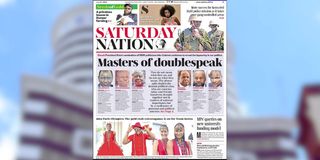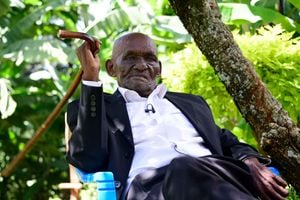
Last Saturday Nation's analysis of how politicians William Ruto, Rigathi Gachagua, Raila Odinga, Wycliffe Oparanya, Hassan Joho, and John Mbadi have altered their stances on various political issues.
Ndeti Somba argues that it’s a misuse of language to label politicians involved in forming the new Cabinet as “masters of doublespeak.”
He contends that they are merely changing their minds, which he deems plain speaking.
And as the African proverb goes, “only a fool does not change his mind,” he says.
Mr Somba's remarks come in response to last Saturday Nation's analysis of how politicians William Ruto, Rigathi Gachagua, Raila Odinga, Wycliffe Oparanya, Hassan Joho, and John Mbadi have altered their stances on various political issues.
The article featured these six politicians under a striking front-page headline, “Masters of Doublespeak,” on July 27, 2024, with a subheading reading: “Deceit: President Ruto’s nomination of ODM politicians into Cabinet continues to reveal the hypocrisy in our politics.”
Mr Somba correctly defines “doublespeak” as language designed to obscure or distort meaning with the intent to deceive. But he overlooks that the politicians' current statements are not as straightforward as they seem.
They contradict previous positions they took to align themselves with new political realities and their self-interests.
The Nation story by Moses Nyamori elaborates on this theme on page 4 with a more explanatory headline, “Ruto, Raila and allies go back on vows to never work together”.
The story notes that President Ruto, for one, had previously committed not to include the opposition in the government.
Mean what they say
The story, as Mr Nyamori puts it, illustrates the phrase, “They do not mean what they say, and they do not say what they mean”.
The phrase aptly summarises the political class, especially in light of President Ruto’s nomination of the four leading ODM officials to the Cabinet.
The officials are Oparanya, Joho, Mbadi and Opiyo Wandayi, who had rubbished President Ruto’s administration.
The story highlights, for example, Joho’s past accusations of graft against President Ruto, when he vehemently stated: “I don’t even dream of engaging Ruto. What will he give me? A wheelbarrow? Which I used to play with as a child?” However, following his Cabinet nomination, he now says: “It’s with great humility and profound appreciation that I accept my nomination by President William Ruto.”
This shift among the politicians regarding significant issues exemplifies doublespeak.
Their current statements starkly contradict their earlier declarations.
Such behaviour is hypocritical, as they mislead the public by presenting statements that obscure their true intentions.
We can’t accept Mr Somba’s view that these are merely changes of heart, that politicians have a right to change their minds.
Doublespeak aptly describes their actions, as it underscores disingenuousness and manipulation to mislead the public. Their transition from vehement opposition to collaboration reflects a calculated attempt to create a consistent narrative, despite the inherent contradictions.
The Nation effectively exposes the hypocrisy of these politicians by investigating and contrasting their past statements with their current positions.
This journalistic endeavour has successfully revealed and contextualised the discrepancies in their behaviour.
The moral of the story is that while journalists should report what politicians say, allowing readers to draw their own conclusions, they also have a duty to provide clarity and context. The Saturday Nation accomplished that admirably.
***
Origins of “doublespeak”:
The term originated from George Orwell’s novel Nineteen Eighty-Four, published in 1949.
In the book, doublespeak refers to language manipulation intended to disguise or distort truth.
Today, it describes deceptive language, particularly in political communication.
The term gained prominence in the 1980s as awareness grew regarding how language could manipulate public perception and promote specific agendas.
Reporting doublespeak is not new to NMG.
However, in the past, it was limited mostly to reporting people accusing others of doublespeak, without investigation or analysis from the reporter.
One of the earliest examples of such reporting was when Rift Valley MPs accused the then Justice Minister Martha Karua of doublespeak (“ODM leaders demand amnesty for suspects,” Sunday Nation, May 18, 2008 ).
Prime Minister Raila Odinga and ODM ministers had called for youths arrested during the 2007-2008 post-election violence to be granted amnesty.
But Ms Karua insisted that those found guilty of taking part in the violence must face the full force of the law.
At the same time, the government had said that it was willing to hold talks with Mungiki, also accused of involvement in the violence.
The Public Editor is an independent news ombudsman who handles readers’ complaints on editorial matters including accuracy and journalistic standards. Email: [email protected]. Call or text 0721989264







